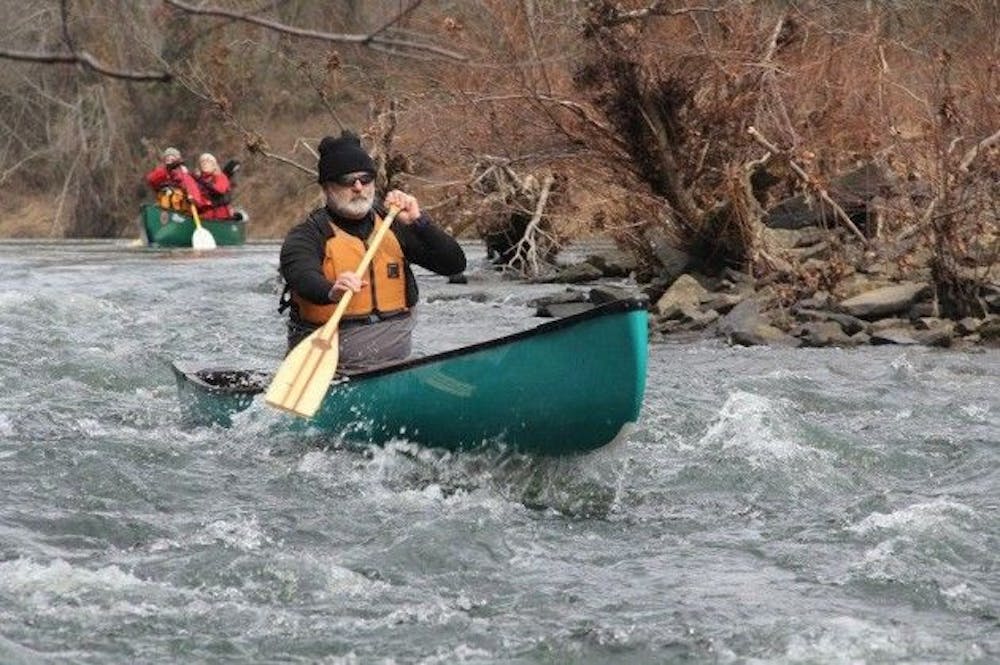For stressed-out students who feel they are up a creek without a paddle at the end of the semester, the Campus Recreation Intramural Services' Canoe Clinic will be offering free canoeing lessons at the Recreation Center Saturday.
The clinic will be held at the Recreation Center's indoor pool starting at 12:30 p.m., and will last four hours. Mark Burk, a representative from the Wolf River Conservancy, will be on hand to teach students basic canoeing techniques and safety guidelines.
"We are excited about this opportunity to offer some skills that will hopefully lead to more outdoor recreation opportunities for students," Laurie Kay, CRIS' marketing and membership coordinator, said.
Burk, a veteran of the waterways, has been teaching canoeing and kayaking for 20 years. He plans to teach students about getting in and out of a canoe, identifying parts of a canoe, balancing a canoe and rowing techniques.
Both Burk and Kay confirmed that, if presented with enough interest, an all-day canoe trip on the Wolf River might be possible.
The Wolf River Conservancy is a non-profit organization that is "dedicated to the protection and enhancement of Wolf River lands for muscle-powered recreation and education." The conservancy was founded in 1985 by a group of volunteers in opposition of a proposed gravel mine on the Banks of the Wolf River near Summer Avenue in Memphis.
Over a quarter of a century later the WRC has expanded its reach to protect over 18,000 acres of the river's watershed including the Ghost River section which was established in 1991. The iconic section derives its name from the frequency in which canoeist and kayakers once lost their way, and is known for its diverse wildlife, which includes otters, darters, minks and bald eagles despite its proximity to a major urban area.
While there are several other sections of the Wolf River being considered, the Ghost River section is a possibility. The river's most scenic stretch-for which the local brewery is named-is home to cypress knobs and an abundance of wildlife.
"It's an amazing little section," Burk said. "You're surprised you're within 20 miles of civilization. It's beautiful."
The roughly 90-mile river is generally divided into the Upper Wolf and Lower Wolf. The Upper Wolf begins at Baker's Pond in Northwest Mississippi and is considered to be the most scenic, while the Lower Wolf snakes through the Memphis Metropolitan Area before reaching its confluence with the Mississippi River north of Downtown Memphis.
As recently as 200 years ago, the Wolf River floodplain was once home to some 30 million acres of bottomland hardwood forests-an indigenous ecosystem to the Southeastern United States. Unfortunately, now only an estimated 40 percent of this ecosystem remains.
Bottomland hardwood forests are river swaps that are found in near streams or rivers that frequently overflow their channeled confines. These forests are usually filled with oak and bald cypress trees, which can survive being partially submerged a portion of the year.
Next May, Burk is planning to run the Mississippi River from source to ocean and hopes to make the roughly 2,400-mile trip with his dog Buddha in 70 days. Although Burk plans to embark on his journey no matter what, he hopes to find a non-profit to paddle for.
"Find out about your environment, and get out and enjoy the outdoors," Burk said. "There are some great rivers within an hour or two drive."
Students interested in reserving a spot can contact Kay at lkay@memphis.edu or call 901-678-3459.




